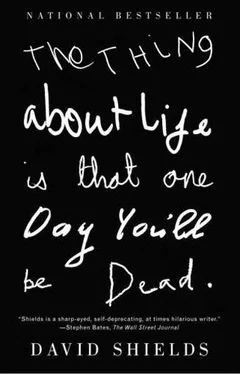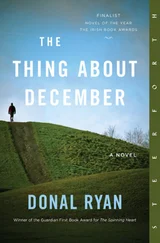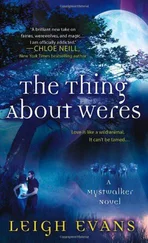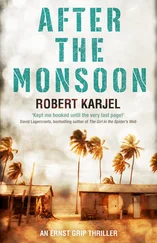While campaigning for Bush-Cheney, former Wyoming senator Alan Simpson, who’s bald, said about Kerry-Edwards, “Everybody is given a certain amount of hormones. If you want to spend yours growing hair, that is your business.”
My father has been bald since his early 40s, is unusually self-conscious about the fact, and is fond of saying that the only cure for baldness is a baseball cap, which he wears around the clock, indoors and out. Although I’ve repeatedly explained to him that a man inherits baldness at least in part from his maternal grandfather, he frequently apologizes for bequeathing to me a bald head. Throughout my 30s I did all the usual boring things: applied Rogaine, studied glossy brochures featuring color photos of weaves, transplants, and men and women in hot tubs. Several years ago, I stumbled upon the shaved-head-and-goatee approach, which I must say I like. It’s an acknowledgment of death rather than a denial of death (as, to take an extreme example, the comb-over is). Your head becomes an early memento mori.
The Trouble with Being Food
Your taste buds regenerate; cells within the taste buds die every ten days and are completely replaced. Even if a nerve that forms taste buds is destroyed, other buds will form around the new nerve that replaces it. However, it takes more molecules of a certain substance on your tongue for you to recognize the flavor later in adulthood. As you get older, you enjoy food less. Whenever I visit, one of the first things my father always wants me to do is drive him to a specialty market, where he buys gourmet health food. I’m not sure he enjoys food anymore, but he’s obsessed with efficient fuel for his body, that amazing machine. He talks with his mouth full and sprays food so often and so far that Natalie, Laurie, and I take turns sitting across from him at restaurants. Natalie has suggested building a portable sneeze-guard.
Nevertheless:
In Britain in 1991, 13 percent of men and 16 percent of women were obese—twice the number of 10 years before. Half the British population is now overweight; more than 20 percent are obese. In the U.K., snack-food consumption has risen 25 percent in the last 5 years.
More than 60 percent of Americans are overweight or obese; 127 million people are overweight, 60 million are obese, and 9 million are severely obese. American adults are now, on average, 25 pounds heavier than they were in 1960; the average man has gone from 166 to 191 pounds, while the average woman has gone from 140 to 164 pounds. I doubt my father has ranged more than a few pounds over or below 155 since World War II. More women than men are obese (34 to 27 percent). The average 10-year-old boy weighed 74 pounds in 1963; he now weighs 85 pounds. The average 10-year-old girl weighed 77 pounds in 1963; she now weighs 88 pounds.
In 1980, the government recommendation was 1,600 calories a day for women and 2,200 for men; women now consume 1,877 calories a day and men consume 2,618. In 1970, each person ate 1,497 pounds of food; in 2000, each person ate 1,775 pounds. In the United States, health care costs for treating obese adults amount to $100 billion a year. In 2004, obesity caused 300,000 deaths.
Was my father ever not as skinny as a (third) rail? His meals very nearly always consist of oatmeal and juice for breakfast, a sandwich and a bowl of soup for lunch, “a lean piece” of fish or chicken for dinner. Has he ever taken a second helping of anything? Has he ever not grumbled before reluctantly accepting an offer of dessert? Has a day ever gone by in which he didn’t exercise a couple of times? On long family car trips, did he ever not get out every few hours and execute a hundred jumping jacks, to the admiration and/or puzzlement of other travelers on the highway?
I live across the street from a fundamentalist church, and on certain melancholy Sundays I’m filled with empathy for the churchgoers. Adulthood didn’t turn out to have quite as much shimmer as we thought it would. For an hour a week, they’re hoping to get caught in a little updraft; who can blame them?
Leonard Michaels wrote, “Life isn’t good enough for no cigarette”—which is precisely how I’ve come to view my relationship to sugar. Today was a disaster, I tell myself at least twice a week, stopping at a café that makes the most perfect Rice Krispies Treats, but this tastes delicious. “Eat dessert first,” as the bumper sticker says, “life is uncertain.” Quentin Tarantino, asked why he eats Cap’n Crunch, replied, “Because it tastes good and is easy to make.” Cap’n Crunch, Rice Krispies Treats: I’m addicted to refined sugar in its less refined forms: breakfast cereal, cookies, root beer floats, licorice, peanut brittle, et al., ad nauseam—kid stuff.
When I’m happy, I consume sweets to celebrate. When I’m upset, I eat treats as consolation. I’m therefore rarely without a reason to be in the throes of sugar shock. I don’t drink. I don’t smoke. I don’t do drugs. I do sugar, in massive doses. So what? Who doesn’t? What’s the harm? I still stutter slightly, and much of the glory of sugar overload is the way it mimics the biochemical frenzy of a full-blown block and crystallizes it into the pure adrenaline of a brief, happy high (followed quickly by a crash). To me, sugar consumption is a gorgeous allegory about intractable reality and very temporary transcendence.
Everything I Know I’ve Learned from My Bad Back
Intractable reality (ii): I’m not thrilled to acknowledge that I date the origin of my back problems to the period, 14 years ago, when I repeatedly threw Natalie, then an infant, up in the air and carried her around in a Snugli. It’s a dubious etiology, since another cause would surely have come along soon enough; my back, one physical therapist has explained to me, was an accident waiting to happen. It makes perverse sense, though, that in my own mind Natalie and my back are intertwined, because dealing with a bad back has been, for me, an invaluable education in the physical, the mortal, the ineradicable wound.
When he became a father, Jerry Seinfeld said, “I can’t get enough of my baby, but let’s make no mistake about why these babies are here. They’re here to replace us. They’re cute, they’re cuddly, they’re sweet, and they want us out of the way.”
I wish I got to indulge in the luxury of being lionized as Atlas by Natalie, but I can’t. I’m still quite good at unscrewing tight bottle caps and pinning her arms when I’m tickling or wrestling her. However, if she’s sitting atop someone’s shoulders on a walk in the woods or getting tossed around in the pool, they’re going to be someone else’s shoulders, or it’s going to be someone else in the pool. At parties, I look first for a chair, since I can’t stand for more than a few minutes. I can’t hula hoop with Natalie or dance with Laurie. Trying to jog, I usually get pins and needles down my right leg. When we take trips, Laurie has to carry the heavy luggage; at home, she moves the furniture. Atlas I ain’t.
You might suspect—I might suspect—Laurie definitely suspects—that maybe I just have a pathetically low pain threshold. And yet my back doctor assures me that with my back, some people play golf and tennis while others have been on disability for 15 years. I fall about in the middle: I’ve never missed a day of work because of my back, but I certainly complain about it a lot; it’s weirdly toward the forefront of my consciousness. I’m not so much a hypochondriac as a misery miser, fascinated by dysfunction. A couple of years ago, I heard an elderly woman, interviewed on the “Apocalypse” episode of This American Life, say she welcomed entering the kingdom of heaven because she would finally be granted relief from her incessant physical pain. While I was listening to this, I was driving, my back was killing me every time I turned the steering wheel, and at that moment, I must admit: I could relate.
Читать дальше












